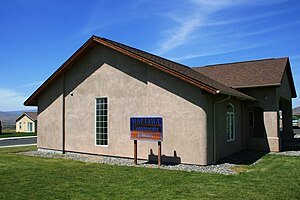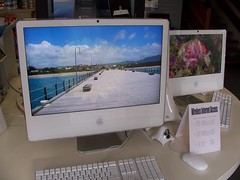Jeff Rubin doesn't fit the typical profile of an interview subject for The Dominion. For more than a decade, he was Chief Economist at CIBC World Markets, one of Canada's largest investment banks. Rubin recently broke ranks with the financial crowd to publish his book, Why Your World is About to get a Whole Lot Smaller. The man once touted as Canada's top economist now predicts the end of globalization because of triple-digit oil prices.
"The same economics that compelled the mass exodus of manufacturing abroad will compel [the] return [of manufacturing to North America] because distance will cost money," he says between sips of San Pellegrino, as we watch container ships move through Vancouver harbour. This end point isn't far away; Rubin predicts that a barrel of oil will hit US $225 by 2012.
Forecasting the price of oil, or anything for that matter, has long been considered a fool's game. And plenty of respected analysts think the former CIBC guru has gone over the top. But, when it comes to looking into the crystal ball of global capitalism, Rubin has a far better track record than most other pin-striped sages. In 2000, Rubin correctly predicted that oil would top $50 per barrel by 2005. And in 2005 he got it right again, forecasting prices would top $100 per barrel in 2007.
The basis of Rubin's predictions—the peak oil theory—is nothing new. However, according to his analysis of oil markets, humanity is going to hit the wall a lot sooner than previously expected. Rubin spoke with journalist Chris Arsenault at the posh Fairmont Hotel on Vancouver's waterfront, before beginning the US leg of his book tour.
The Dominion: Some analysts estimate that 25 per cent of the world's hydrocarbons are located in the Arctic and will soon be open to exploitation due, ironically, to global warming. Won't this new supply nullify the severity of price rises?
Jeff Rubin: The stuff in the Arctic is a drop in the bucket. You are losing sight of what the Cambridge Energy Research Associates and Exxon don't tell you about. They hold big press conferences to talk about, 'Oh we just discovered the Jack Field—10,000 feet under the hurricane-ravaged waters of the Gulf of Mexico, isn't that fantastic.'
They don't hold press conferences [to announce], 'See this field here? It has been producing for 50 years. It's about to run dry.'
Every year we lose four million barrels a day [of production due to depletion]. Over the next five years, we are going to have to find 20 million barrels a day of new production, just so that we can [continue to] consume what we consume today.
The Canadian tar sands have become a major new source of crude; Canada is now the number one foreign exporter to the US. Won't these massive, unconventional reserves around Fort McMurray offset depletion from older fields in Mexico or Saudi Arabia?The attractiveness of Fort McMurray is not just what is under the ground; it's where it is [located]. In Fort McMurray, all Exxon has to do is sponsor a minor hockey team and they are 'good corporate citizens.' In most places in the world, they're starting to believe oil and natural gas resources should be owned and operated by the state. The world has already gotten a lot smaller for Exxon. Outside of Canada, the US and a handful of other countries, it is the state companies who control access to hydrocarbon resources.
As far as Fort McMurray, there are 165 billion barrels of oil trapped in those sands. To produce one barrel of synthetic oil, you have to burn 1,400 cubic feet of natural gas, schlep two tons of sand [and] pollute 250 gallons of water. The very prices that will be needed to bring that oil out of the ground are the same prices that will take you off the road. Sure, at $200 a barrel of oil, we can produce four million barrels per day out of Fort McMurray. But, at $200 for a barrel of oil, you are talking seven dollars for a gallon of gasoline.
At what point does the price of oil make export-driven globalization untenable?The model as we know it peaked in 2007. If we measure globalization by the percentage of world GDP that is an export or an import, 2007 will mark the peak of a past age.
You are going to see less and less container ships. All of those containers are about one thing: a wage ark. Moving your factory from someplace where you pay folks 30 bucks an hour to somewhere where you pay folks 30 bucks a week is great, if it's just about wages.
But what moves those container ships is oil. At $150 to $200 per barrel, the wage ark becomes penny wise and a pound foolish because what you save on a wage bill you more than spend on bunker fuel.
If free markets worked as the economics textbooks say they should, high oil prices would lead companies to invest in green technologies. Why aren't we seeing viable alternatives to petroleum?It is all a question of time. Higher prices will light the path. And I am sure in 20, 25 years we will have new fuel technologies.
Unfortunately, our rendezvous with triple-digit oil prices isn't in 25 years, it's in 12 months. We have to figure out a way of engineering our economy and our lives to use less energy.
If the market can't create viable alternative energy technologies, what role do governments have in ending fossil-fuel dependency?
I don't believe in government, I believe in the market, I believe in prices. I believe prices will show us what to do. Sure, we need to be more efficient. But the emphasis has to be on conservation, so peak oil doesn't have to equal peak GDP.
Couldn't increased energy efficiency make up for shortfalls in production?
We think that efficiency leads to conservation, but history has shown that is not what happens.
The average engine today is 30 per cent more efficient than the engines produced before the OPEC oil shocks [of the 1970s]. Yet, the average [North American] vehicle consumes just as much gasoline in the course of a year.
Back in the 1970s, we [North Americans] used to drive about 9,000 miles a year; now we drive 12,000. Back in the 1970s, we weren't living in the far-flung suburbs. All those gains in efficiency have led us to, ever more efficiently, consume more and more oil.
How will triple-digit oil prices affect politics?
The US steel workers should be at the forefront, arguing to Obama for a price on carbon emissions. I think you'll find that when unions go through the math, Archie Bunker is going to get into bed with Al Gore.
We [North America] can produce a ton of steel and emit one-third less CO2 than steel producers in a developing country like China. Right now, that is totally irrelevant. There is no price advantage to [producing with less greenhouse gas emissions], so it doesn't flow to the bottom line and it doesn't affect where steel jobs are. But, if you are one-third more efficient, you want the price of emissions to be as high as possible—the higher the price of emissions, the greater the economic advantage.
By putting a price on carbon emissions and making our trading partners pay the same price, going green is going to bring jobs home instead of sending them away.
Won't those proposed duties, either though a carbon tax or a cap and trade system, come into conflict with World Trade Organization rules?
I would argue that is a market failure. The only reason that those steel plants went to China in the first place is because we didn't put a price on carbon emissions. In an efficient, functioning market we would have allocated resources much differently.
The carbon-spewing industries of the world should not be in the places that have the cheapest labour, but rather in places [with] the cleanest technologies. That's not where these industries are located today.
You don't seem too upset about globalization coming to an end.
I don't think this story has to be as apocalyptic as peak oil is usually displayed. It is apocalyptic if we insist on having the lifestyles we had when oil was cheap and abundant, if we insist on commuting 40 miles back and forth to work in our SUVs and importing steel from China and flatscreen TVs from Korea or Taiwan.
But I'm hopeful. I'm not hopeful because of governments; I'm an economist, I believe in prices.
I understand that there are folk who have already adopted the local paradigm for cultural or ecological reasons. But whether you think that way or not, you are going that way for the very simple fact that you won't be able to afford any other way.
When gas is seven dollars a gallon, no one is going to have to buy my book to know what to do. Folks are going to get off the road because they can't afford to drive. When there is no bus to get on, they will get their politician's attention. Why are we bailing out Detroit when 50 million vehicles are likely to head off the road in the next ten years? We should be investing in public transit, not cars.
It's now widely accepted that the invasion and occupation of Iraq was primarily about oil. Just ask former Federal Reserve Chairman Alan Greenspan. A lot of analysts are predicting a violent scramble for the last remaining resources. Where do you think these conflicts might happen?
Let's understand that when we are talking about hydrocarbons, we aren't just talking about moving cars or powering container ships. We are talking about food. Modern agriculture is really the massive transformation of hydrocarbons into food [through] fertilizer, irrigation and mechanization. If you look at arable land under cultivation, it hasn't grown in the last 10 to 15 years. All the increases in world food production have come from increasing the yield per acre. All of those increases have come about by adding more fertilizer to the land and using more tractors.
The real challenge is: does peak oil equal peak food? If there are going to be wars, I suggest that will be the fault line.
Take countries like Saudi Arabia; they are buying land in Pakistan and Africa to grow food. The countries that rent the land? None of that food is going to their populations. What happens when their population starts to starve and they see their land being used to grow food for people in other countries? Is that a sustainable model?
Are you growing a garden?
[Laughs] No, but where I live [in Toronto], and a lot of places, have artisanal food stalls every weekend. It's organic food, basically grown around [the local area] and it's happening more and more.
At first, [organic local food markets] might be a yuppie thing to do. But soon it's going to be mainstream because that's going be the only kind of food we can afford to eat. That is going to mean changes to our diet. When I was a kid, there were no blueberries and raspberries in January; we are going to have to go back to local diets.
Chris Arsenault holds the Phil Lind Fellowship at the University of British Columbia's Department of History. He is currently writing a history of sabotage and the Alberta oil patch.
 The projects that transportation planners should be working on are how to use the rail and the river to make autos unnecessary, not how to promote more driving. Image via Wikipedia
The projects that transportation planners should be working on are how to use the rail and the river to make autos unnecessary, not how to promote more driving. Image via Wikipedia
![Reblog this post [with Zemanta]](http://img.zemanta.com/reblog_e.png?x-id=b0f6a97d-871b-4ad9-93d7-c4a31eccd569)



![Reblog this post [with Zemanta]](http://img.zemanta.com/reblog_e.png?x-id=9fd7b0e4-91f6-462c-8707-79189303b0d6)

![Reblog this post [with Zemanta]](http://img.zemanta.com/reblog_e.png?x-id=dec4fb16-8752-4725-8fbf-fa0208dc96dd)

![Reblog this post [with Zemanta]](http://img.zemanta.com/reblog_e.png?x-id=e453ee08-8971-4b17-8fcb-465d792a71cc)

![Reblog this post [with Zemanta]](http://img.zemanta.com/reblog_e.png?x-id=3af72a5d-a31e-4432-8fe3-139e498724a1)




![Reblog this post [with Zemanta]](http://img.zemanta.com/reblog_e.png?x-id=0ac8f20f-883e-403d-b9f5-962386011eaa)

![Reblog this post [with Zemanta]](http://img.zemanta.com/reblog_e.png?x-id=14a77524-4ae4-4dd9-926b-2a7ae3e5b4c5)

![Reblog this post [with Zemanta]](http://img.zemanta.com/reblog_e.png?x-id=49747e78-4f06-495c-84ab-1b0a9a3b7408)

![Reblog this post [with Zemanta]](http://img.zemanta.com/reblog_e.png?x-id=89c8a2a3-e14b-488e-9542-279e923ce16c)


![Reblog this post [with Zemanta]](http://img.zemanta.com/reblog_e.png?x-id=2e190162-cf4c-49ef-95d0-e82021c12a1f)

![Reblog this post [with Zemanta]](http://img.zemanta.com/reblog_e.png?x-id=c2b35a46-c447-4bcb-b277-d33ea342b024)

![Reblog this post [with Zemanta]](http://img.zemanta.com/reblog_e.png?x-id=c5c8cfb6-63d8-40c8-9359-3944786fa316)


![Reblog this post [with Zemanta]](http://img.zemanta.com/reblog_e.png?x-id=0bfb0807-c2ba-4512-8b19-e6fe5f889eae)




![Reblog this post [with Zemanta]](http://img.zemanta.com/reblog_e.png?x-id=4d61759a-b049-4f5b-a9f9-2f5dbb27fcb1)

![Reblog this post [with Zemanta]](http://img.zemanta.com/reblog_e.png?x-id=ebff1676-8552-4e8e-9c55-291778dc30b4)

![Reblog this post [with Zemanta]](http://img.zemanta.com/reblog_e.png?x-id=df3b574a-6227-43c9-a202-2775972cd31d)


![Reblog this post [with Zemanta]](http://img.zemanta.com/reblog_e.png?x-id=d224877c-4e5f-4f15-a5cc-3243d6a92511)

![Reblog this post [with Zemanta]](http://img.zemanta.com/reblog_e.png?x-id=573ece0c-20d4-4831-aa08-a5e9b56da9dc)



